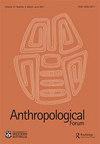Magic, Self and (World) Society: Groundwork for an Existential and Cosmopolitan Anthropology
IF 0.7
3区 社会学
Q3 ANTHROPOLOGY
引用次数: 0
Abstract
ABSTRACTHuman beings can be found everywhere (Piette) and the true subject of anthropology is anyone (Rapport). What do we need to do to our epistemology and practice to reframe anthropology in existential and cosmopolitan terms? This paper explores processes of cosmology- and society-making through an existential and cosmopolitan epistemology and axiology. We can reenlist classic anthropological discussions on magic to understand how subjects generate a Society into which they insert themselves as creative agents. Magical practice shows how Society is uniquely biographical and personal, and that subjectivity is an irreducible and ‘in-additive’ source of social and cosmological structure. Cosmopolitan anthropology describes, then, encounters of ‘non-interchangeable’ (Kneubuhler) biographical selves meeting in and constructing world-space; different selves on diverse cosmopolitanizing trajectories engage in divergent biographical worldmaking practices. In this light, cosmopolitan anthropology takes the form of analytic biography, tracing and retracing these unfoldings of self-orienting structure. Two radically distinct examples of subject-oriented cosmology-making are enlisted: Rastafari I-Yaric and Arrernte tjurunga knowledge. Disclosure StatementNo potential conflict of interest was reported by the author(s).Notes1 I met Mauritz on a streetside in Kingston, Jamaica, in June 2019.2 For the purposes of these notes I have capitalized Society to underline that I am not using this term in its sociological sense as a social, hence objective, fact, but in an existential-‘Simmelian’ one as a subjective reification.3 The idea that the social field ‘affords’ potentials to its different subjects adapts Gibson (Citation1986) without taking on the entire Gibsonian epistemology.4 British Prime Minister, Theresa May used it in a speech to her political party in 2016: ‘But if you believe you’re a citizen of the world, you’re a citizen of nowhere. You don’t understand what the very word “citizenship” means’. Unwittingly, May adverts to the centrality of imagination and wish fulfilment in the construction of Society and citizenship.5 In many groups reincarnation seemed to follow clear lines of inheritance from the parents with the spirit child choosing a father or mother who was of a like totem. In some groups the spirit children reincarnated as males on some occasions, females on others, taking up their place in the symmetrical tribal inter-generational marriage sections proportionately.6 ‘Piaget on Piaget: The Epistemology of Jean Piaget’: 1977, Yale University.魔法、自我和(世界)社会:存在主义和世界主义人类学的基础
人类无处不在(Piette),人类学的真正研究对象是任何人(Rapport)。我们需要对我们的认识论和实践做些什么,以存在主义和世界主义的方式重新构建人类学?本文从存在主义和世界主义的认识论和价值论的角度探讨了宇宙论和社会建构的过程。我们可以重新利用关于魔法的经典人类学讨论,来理解主体是如何产生一个社会的,在这个社会中,他们作为创造性的代理人将自己插入其中。魔法实践表明,社会是独特的传记和个人,而主体性是社会和宇宙结构的不可简化和“附加”的来源。因此,世界主义人类学描述了“不可互换”(Kneubuhler)的传记自我在世界空间中相遇并构建世界空间的相遇;在不同的世界化轨迹上,不同的自我参与了不同的传记世界建构实践。据此,世界主义人类学采取分析传记的形式,追踪和回溯这些自我导向结构的展开。本文列举了两个截然不同的以主体为导向的宇宙学创造的例子:拉斯塔法里·亚里克和阿伦特·特朱伦加知识。披露声明作者未报告潜在的利益冲突。注1:我于2019年6月在牙买加金斯顿的一条街道上遇到了莫里茨。2出于这些笔记的目的,我把“社会”这个词大写,以强调我不是在社会学意义上使用这个词作为一个社会的、因此是客观的事实,而是在一个存在主义的、“西美尔式的”存在主义的、作为主观具体化的事实社会场域为其不同的主体“提供”潜力的观点适应了吉布森(Citation1986),但没有采取整个吉布森认识论2016年,英国首相特蕾莎·梅在其政党的一次演讲中使用了这个词:“但如果你认为自己是世界公民,那你就不是任何地方的公民。”你不明白‘公民身份’这个词是什么意思。在不知不觉中,梅强调了想象和愿望实现在社会和公民建构中的中心地位在许多群体中,转世似乎遵循父母明确的遗传路线,精神孩子选择具有类似图腾的父亲或母亲。在一些群体中,灵子有时转世为男性,有时转世为女性,在对称的部落代际婚姻中按比例占有一席之地。《皮亚杰论皮亚杰:皮亚杰的认识论》,1977年,耶鲁大学。
本文章由计算机程序翻译,如有差异,请以英文原文为准。
求助全文
约1分钟内获得全文
求助全文
来源期刊

Anthropological Forum
ANTHROPOLOGY-
CiteScore
3.60
自引率
10.00%
发文量
14
期刊介绍:
Anthropological Forum is a journal of social anthropology and comparative sociology that was founded in 1963 and has a distinguished publication history. The journal provides a forum for both established and innovative approaches to anthropological research. A special section devoted to contributions on applied anthropology appears periodically. The editors are especially keen to publish new approaches based on ethnographic and theoretical work in the journal"s established areas of strength: Australian culture and society, Aboriginal Australia, Southeast Asia and the Pacific.
 求助内容:
求助内容: 应助结果提醒方式:
应助结果提醒方式:


